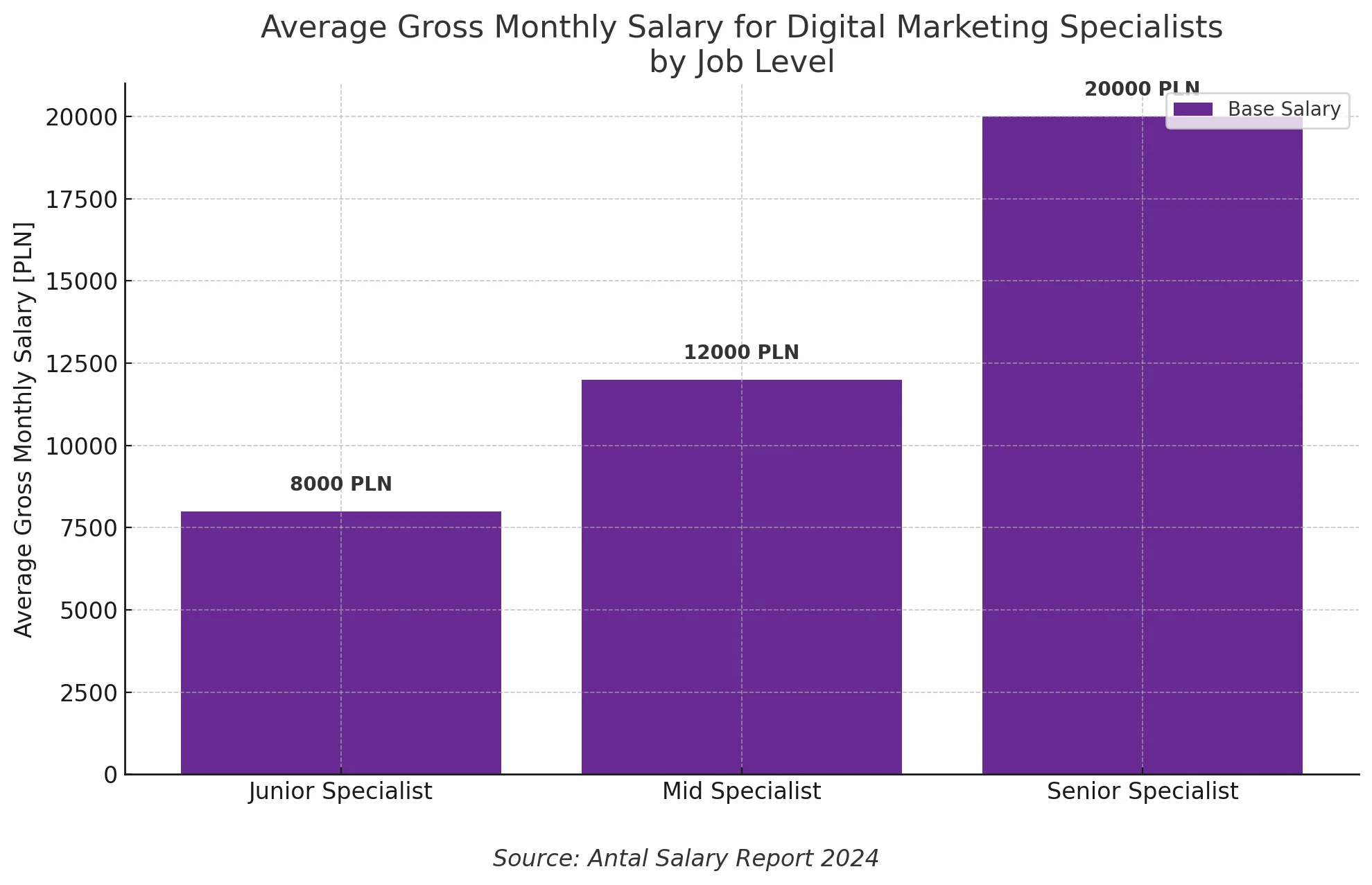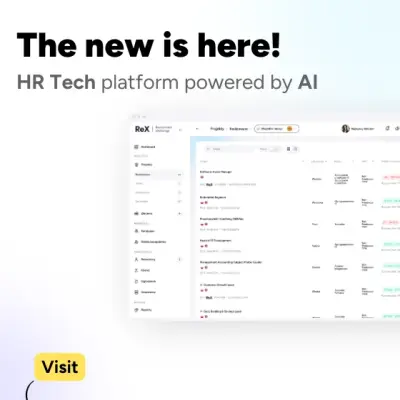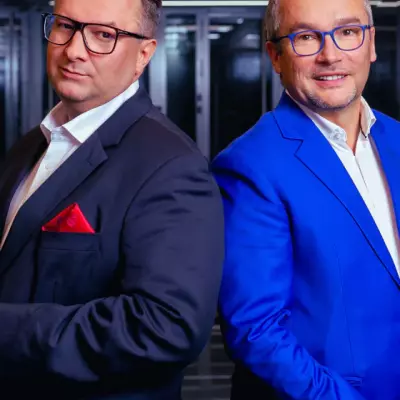Digital Marketing Specialist – What Do They Do and How Much Do They Earn?
Table of contents
Digital marketing is a rapidly growing field that is increasingly influencing business development strategies in Poland and around the world. As the internet and digital tools continue to evolve, the demand for digital marketing specialists—individuals who can effectively use modern communication and online sales channels—is steadily increasing. What does this role involve, what qualifications are required, and what salary can one expect? The answers are in the article below.
What Does a Digital Marketing Specialist Do?
A Digital Marketing Specialist (often referred to as a digital marketer) is responsible for planning, implementing, and analyzing marketing activities conducted through digital channels. This person combines analytical, creative, and technical skills to attract customers and build a strong brand presence online.
The main areas a digital marketing specialist typically works in include:
- SEO (Search Engine Optimization) – optimizing content and websites to increase visibility in search engine results for specific keywords.
- SEM (Search Engine Marketing) – running paid advertising campaigns in search engines such as Google Ads to drive traffic and increase brand recognition.
- Content marketing – creating valuable, engaging content that captures attention and builds trust in the brand.
- Email marketing – executing email campaigns such as newsletters to build long-term relationships with clients.
- Social media marketing – managing the brand’s presence on platforms like Facebook, Instagram, LinkedIn, and TikTok, running campaigns and engaging with audiences.
- Performance marketing – activities focused on specific results, such as lead acquisition, purchases, or sign-ups.
In daily work, a digital marketing specialist monitors campaign effectiveness using analytics tools (e.g., Google Analytics), conducts A/B tests, and optimizes strategies based on data to maximize the marketing budget.
In some organizations, digital marketing specialists are also involved in branding initiatives and customer experience improvement projects, highlighting the strategic and interdisciplinary nature of the role.
Digital Marketing Specialist – Required Qualifications
While there is no single universal path to becoming a digital marketing specialist, there are certain competencies and experiences that significantly boost one’s chances of success. The key lies in combining theoretical knowledge with practical skills.
Most commonly expected requirements include:
- Relevant education – marketing, economics, management, communications, or IT (preferred but not always necessary, as employers increasingly prioritize demonstrable experience and results).
- Familiarity with marketing tools, including Google Ads, Meta Ads, Google Analytics 4, Semrush, Ahrefs, Hotjar, and CRM systems like HubSpot or Salesforce.
- Data analysis skills – digital marketing is data-driven, so the ability to interpret KPIs and ROI and optimize actions accordingly is crucial.
- English proficiency – essential for using tools, reading documentation, and following industry courses.
- Industry certifications – such as the Google Ads Certificate, Meta Blueprint, and HubSpot Academy credentials.
- Creativity and communication skills – for storytelling, creating engaging content, and effective teamwork.
- Knowledge of AI tools – such as ChatGPT, Jasper.ai, and Midjourney – increasingly valued for campaign automation and idea generation.
- Strategic mindset – the ability to plan long-term campaigns aligned with the customer journey and business goals.
What Are the Responsibilities of a Digital Marketing Specialist?
Responsibilities may vary depending on the company’s size and structure, but certain tasks are common across organizations. Key duties include developing and executing digital advertising campaigns—both in search engines (Google Ads) and on social media platforms (Meta Ads, LinkedIn Ads). The specialist also manages the brand's social media presence, builds communication strategies, creates engaging content, and runs paid campaigns.
Another important area is website SEO optimization to increase search engine visibility and generate valuable organic traffic. Email marketing is also within the specialist’s scope—crafting newsletters and automating communication based on user behavior and needs.
The digital marketer analyzes performance, tracks key metrics (KPIs), calculates ROI, and prepares reports for internal teams and leadership. They collaborate closely with graphic designers, copywriters, UX specialists, and external agencies. Often, they serve as a bridge between marketing and sales, supporting conversion goals and lead generation efforts.
Other responsibilities include managing the marketing budget, testing new technologies, and implementing tools to boost online brand visibility. Increasingly, digital marketers also manage influencer collaborations—identifying key opinion leaders, negotiating partnerships, and analyzing results, both in B2C and B2B settings.
Experienced specialists often take on website optimization for user experience (UX) and conversion rate (CRO), directly impacting sales performance.
Is It a Future-Proof Career?
Absolutely. Digital marketing specialists are among the most sought-after professionals in today’s job market—both in Poland and globally.
Industry reports show that:
- Over 70% of companies in Poland are increasing investment in digital activities.
- Across Europe, demand is growing for experts in performance marketing, analytics, SEO, and automation.
- Trends such as artificial intelligence, content personalization, augmented reality (AR), and voice search are creating new specialist niches.
Digital marketing also offers the flexibility of remote work and the ease of switching industries (e.g., from e-commerce to financial services), making it appealing to professionals seeking flexible career paths.
Moreover, it provides great opportunities for freelancing or running a personal business. Many professionals, after a few years of experience, move into consulting, start their own agencies, or become industry trainers.
How to Become a Digital Marketing Specialist?
There are many paths to a career in digital marketing, but it often starts with self-learning. Online courses on platforms such as Coursera, Udemy, Google Skillshop, and HubSpot Academy, along with industry literature and podcasts, form a solid foundation. Internships in marketing agencies or involvement in non-profit projects are excellent ways to build a portfolio.
A crucial step is obtaining industry-recognized certifications like Google Ads Certificate or Meta Blueprint to validate practical skills. Simultaneously, building a professional network—through industry events or LinkedIn—can open new career opportunities. Once a candidate has some achievements under their belt, like a successful ad campaign or significant traffic growth, they can confidently apply for junior positions, such as Junior Digital Marketing Specialist.
Free educational programs, like Google Digital Garage or HubSpot’s introductory courses, are great for beginners. Starting a blog or a small online store is another effective way to demonstrate competence. Participating in hands-on workshops on topics like LinkedIn Ads or GA4 can also significantly increase one’s competitiveness on the job market.
What Is the Salary of a Digital Marketing Specialist?
According to the Antal 2024 Salary Report, the average gross monthly salary in marketing and sales is 14,182 PLN. For the role of "Marketing Specialist" (including digital marketing), the typical salary range is 7,000 – 9,000 PLN gross.
Salaries increase with experience and specialization. Mid- and senior-level professionals (e.g., Digital Manager, Performance Marketing Manager) can expect:
- 10,000 – 14,000 PLN gross per month – for specialists with several years of experience in large companies.
- 15,000 – 25,000 PLN gross per month – for managers and experts in major corporations, particularly in cities like Warsaw, Kraków, and Wrocław.

Digital marketing salaries are often performance-based. Many companies use hybrid compensation models—a base salary plus bonuses tied to KPIs such as lead acquisition cost, ROAS, CPA, or e-commerce sales growth.
Additional benefits may include annual bonuses, private healthcare, training programs, remote work opportunities, flexible hours, and development initiatives.
A Digital Marketing Specialist is a role that blends creativity with technology and has a promising future. If you see yourself in this position, don’t wait—take the first step today and check out current job offers!














